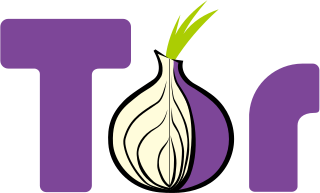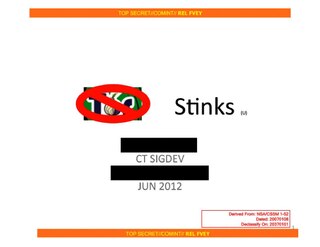A web browser is a software application for accessing information on the World Wide Web. When a user requests a web page from a particular website, the web browser retrieves the necessary content from a web server and then displays the page on the user's device.

Alexa Internet, Inc. is an American web traffic analysis company based in San Francisco. It is a wholly owned subsidiary of Amazon.
The deep web, invisible web, or hidden web are parts of the World Wide Web whose contents are not indexed by standard web search-engines. The opposite term to the deep web is the "surface web", which is accessible to anyone/everyone using the Internet. Computer-scientist Michael K. Bergman is credited with coining the term deep web in 2001 as a search-indexing term.
A dark net or darknet is an overlay network within the Internet that can only be accessed with specific software, configurations, or authorization, and often uses a unique customized communication protocol. Two typical darknet types are social networks, and anonymity proxy networks such as Tor via an anonymized series of connections.

.onion is a special-use top level domain name designating an anonymous onion service, which was formerly known as a "hidden service", reachable via the Tor network. Such addresses are not actual DNS names, and the .onion TLD is not in the Internet DNS root, but with the appropriate proxy software installed, Internet programs such as web browsers can access sites with .onion addresses by sending the request through the Tor network.

Tor is free and open-source software for enabling anonymous communication by directing Internet traffic through a free, worldwide, volunteer overlay network consisting of more than seven thousand relays in order to conceal a user's location and usage from anyone conducting network surveillance or traffic analysis. Using Tor makes it more difficult to trace the Internet activity to the user: this includes "visits to Web sites, online posts, instant messages, and other communication forms". Tor's intended use is to protect the personal privacy of its users, as well as their freedom and ability to conduct confidential communication by keeping their Internet activities unmonitored.

DuckDuckGo is an internet search engine that emphasizes protecting searchers' privacy and avoiding the filter bubble of personalized search results. DuckDuckGo distinguishes itself from other search engines by not profiling its users and by showing all users the same search results for a given search term.

Evercookie is a JavaScript application programming interface (API) that identifies and reproduces intentionally deleted cookies on the clients' browser storage. It was created by Samy Kamkar in 2010 to demonstrate the possible infiltration from the websites that use respawning. Websites that have adopted this mechanism can identify users even if they attempt to delete the previously stored cookies.
Internet censorship circumvention is the use of various methods and tools to bypass internet censorship.

The Hidden Wiki is the name used by several censorship-resistant wikis operating as Tor hidden services that anyone can anonymously edit after registering on the site. The main page serves as a directory of links to other .onion sites.

Torch is a Chromium-based web browser and Internet suite developed by Torch Media. The browser handles common Internet-related tasks such as displaying websites, sharing websites via social networks, downloading torrents, accelerating downloads and grabbing online media, all directly from the browser. Torch Browser is commercial freeware.

Tor Mail is a former Tor hidden service that went offline in August 2013 after an FBI raid on Freedom Hosting. The service allowed users to send and receive email anonymously, to email addresses inside and outside the Tor network.
Freedom Hosting is a defunct Tor specialist web hosting service that was established in 2008. At its height in August 2013, it was the largest Tor webhost.
The dark web is the World Wide Web content that exists on darknets: overlay networks that use the Internet but require specific software, configurations, or authorization to access. Through the dark web, private straphanger networks can communicate and conduct business anonymously without divulging identifying information, such as a user's location. The dark web forms a small part of the deep web, the part of the Web not indexed by web search engines, although sometimes the term deep web is mistakenly used to refer specifically to the dark web.

Tor2web is a software project to allow Tor hidden services to be accessed from a standard browser without being connected to the Tor network. It was created by Aaron Swartz and Virgil Griffith.
Grams is a discontinued search engine for Tor based darknet markets launched in April 2014, and closed in December 2017. The service allowed users to search multiple darknet markets for products like drugs and guns from a simple search interface, and also provided the capability for its users to hide their transactions through its bitcoin tumbler Helix.
Ahmia is a clearnet search engine for Tor's hidden services created by Juha Nurmi.
facebookcorewwwi.onion is a site that allows access to Facebook through the Tor protocol, using its .onion top-level domain. In April 2016, it had been used by over 1 million people monthly, up from 525,000 in 2015. Neither Twitter nor Google operate sites through Tor, and Facebook has been applauded for allowing such access, which makes it available in countries that actively try to block Facebook.








